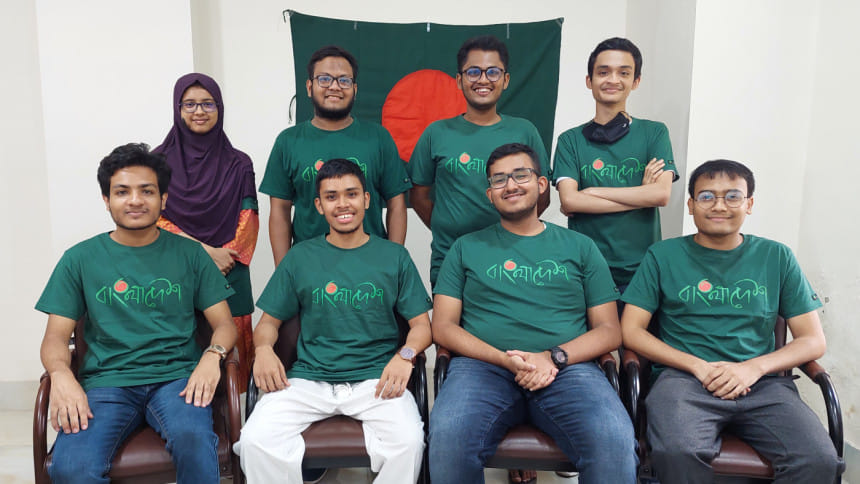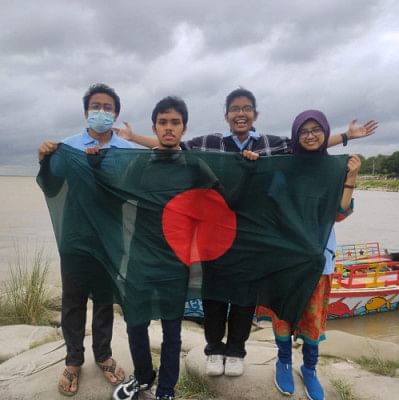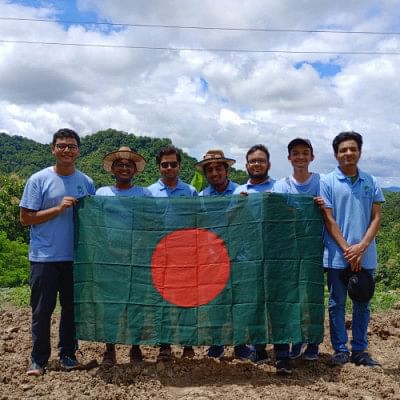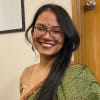Bangladeshi teams make waves in the International Earth Science Olympiad 2022

The International Earth Science Olympiad (IESO) is one of the thirteen International Science Olympiads that take place annually. In the 15th IESO, which took place this year, the Bangladesh team made waves by winning eight medals. Seven of these medals are in the bronze category and one in silver category.
The competition was hosted virtually by Italy this year from the August 25 to 31, 2022. This year, 1000 students hailing from different areas of Bangladesh participated in the highly rigorous selection process. Ultimately, two teams consisting of eight members each were created, who represented Bangladesh in the IESO.
Soumya Saha from Notre Dame College, Sabit Ibtisam Anan from Dhaka Residential Model college, M. S. Mottaquin Tashin from Dhaka Imperial College, and Syed Iftekhar Salam Dipto from Dhaka College earned a bronze medal each in the individual category of the competition.
Bangladesh Team 2 consisting of Muntasir Rahman from Adamjee Cantonment College, Ilhamul Azam from Govt. Hazi Muhammad Mohsin College, Soumya Saha, and M. S. Mottaquin Tashin earned a silver medal for the National Team Field Investigation (NFTI) presentation on the causes of recent landslides in Rangamati, Bangladesh.
The other Bangladesh team consisting of Abrar Azim Hrittek from Cantonment Public School & College, Faiza Islam from Rajshahi College, and Syed Iftekhar Salam Dipto earned a bronze medal for their NFTI presentation on groundwater contamination and soil nutrient depletion in different riverine cities in Bangladesh.
Apart from that, Mottaquin and Ilham also won bronze medals separately in a mixed nations team event called the Earth Systems Project (ESP), making mini poster-presentations on climate change and its impact on natural hazards and tropical cyclones respectively.
This year's medals signified Bangladesh's best performance since 2012.
SHOUT reached out to three of these bright individuals to hear their thoughts on the whole experience.
The candidates all expressed gratitude at being able to represent Bangladesh on a global platform and win medals for their hard work. Muntasir Rahman, whose team won the silver medal, said, "Up until the team selections, we were very individually focused. But as soon as we got into our teams, we thought that now we are representing Bangladesh and cannot be individualistic anymore."
Soumya Saha, who was in the same team and received the bronze medal in the individual category, added, "Every olympian dreams of representing our red and green flag on an international stage. Thousands of candidates fight in the rigorous selection process both inside and outside Bangladesh, so as a debutant this year, it has been a fascinating journey."
When asked about their interest in earth sciences, the three candidates had different backstories. Faiza Islam, whose team won bronze for their work on groundwater contamination and soil depletion in different riverine cities in Bangladesh, said, "I have always liked environmental science a lot. In 2019 and 2020, I applied for the competition but ultimately, it did not work out. However, when I applied this year, I finally made it to the team selection."

Muntasir, who was relatively new to the world of environmental science, added, "I was always fascinated by the concept of earth science. Our NCTB curriculum did not teach much about the topic but it was briefly covered in other subjects like chemistry, Bangladesh and Global Studies, etc. But personally, I was not aware that earth science was an alternate field of study even until last year. When I participated in the competition, I really liked the topics and concepts in the, so I dived into them."
Soumya stated, "I was a frequent participant in the olympiads but not for earth science. I was a debutant in the field this year, so my journey with environmental science is not very old. Previously, I was interested only in astronomy, astrophysics, and meteorology. These were my strongest zones in earth sciences. I started to explore other sectors of earth science such as geology, hydrology, etc. in February, when I participated in the regional round of the competition."
IESO further provided a unique experience of allowing the candidates to conduct field research work for the competition.
"As a high school student, our academic sector does not have any research-based work or field work, '' said Soumya. "We just attend labs for physics, chemistry, etc. and that's about it for the field work. But National Earth Olympiad (NEO) did something more than that, for the very first time I went to field work and experimented through lab projects. We were provided with highly advanced equipment from Dhaka University, and we even got the chance to learn how specific paperwork is done for research work."
Muntasir seconded the unique feeling of working in the field by saying, "It was one of the coolest experiences. It was a unique experience for the Bangladeshi teams as previous teams did not get the chance to do field work so we were the first ones. We enjoyed the trip a lot. We learned a lot of course, as we were out collecting data. But as a team, we had a lot of fun exploring Rangamati."

As for their potential future involvement in earth science, all three candidates displayed great interest in different areas. Faiza said, "Regardless of which field I go into, I always wanted to work on something that can reduce negative environmental impacts as much as possible. This could be focused on entrepreneurship, like some sort of venture, or something that could raise awareness."
Muntasir expressed interest in staying engaged with the earth science olympiad community and added, "Competitions regarding earth sciences are really rare and limited. And I'll be graduating soon so high school level competitions are not there for me. But I see myself continuously engaging with the earth science community in Bangladesh. As our 2022 batch is successful, we have to be there for future generations of earth science olympians."
Soumya talked about his future education and said, "Even before the competition, I worked on topics related to hydrology and oceanography earlier this year. Since earth science is a huge subject to explore. For my personal fields of interests, they would definitely be astronomy, oceanography and meteorology. I would like my major to be related to these topics."
Bangladesh Youth Environmental Initiative (BYEI), a youth-led environmental non-profit, selected the Bangladesh team through a nationwide competitive selection process called the National Earth Olympiad (NEO). This year, the Olympiad was supported by the British High Commission in Dhaka, through the UK Government's roles as Commonwealth Chair-in-Office and host of COP26.

 For all latest news, follow The Daily Star's Google News channel.
For all latest news, follow The Daily Star's Google News channel. 








Comments